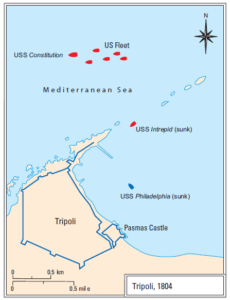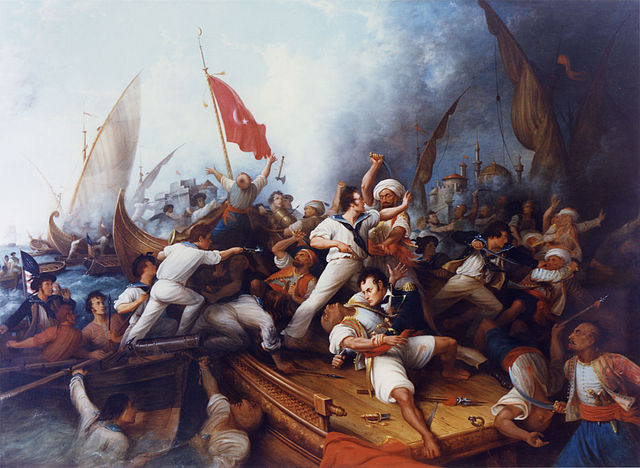Editor: Michael Spilling and Consultant Editor: Chris McNab
American Battles and Campaigns – First Barbary War 1801–05
The First Barbary War (1801–1805), also known as the Tripolitanian War and the Barbary Coast War, was the first of two Barbary Wars between the United States and the four North African states known collectively as the “Barbary States”. Three of these were nominal provinces of the Ottoman Empire, but in practice autonomous: Tripoli, Algiers, and Tunis. The fourth was the independent Sultanate of Morocco. The cause of the war was pirates from the Barbary States seizing American merchant ships and holding the crews for ransom, demanding the U.S. pay tribute to the Barbary rulers. United States President Thomas Jefferson refused to pay this tribute.

Tripoli Harbour, 1804
Cdre Edward Preble assumed command of the US Mediterranean Squadron in 1803 and blockaded Tripoli harbor to prevent raids by the Barbary pirates. The first significant action of the blockade came on 31 October, when the 36-gun frigate USS Philadelphia ran aground on an uncharted reef and was captured by Tripolitan gunboats together with its crew and Capt William Bainbridge. Although the frigate was unfit for sea, it was anchored in the harbor as a floating battery.
If the Philadelphia could be repaired, it would become the Barbary pirates’ most powerful naval unit and its destruction was Preble’s top priority. The defenses of Tripoli harbor ruled out a conventional naval attack and it was decided that a night raid offered the best chance of success. On the night of 16 February 1804, a captured Tripolitan ketch renamed USS Intrepid disguised as a local merchant vessel sailed into the harbor under the command of Lt Stephen Decatur, Jr. He bluffed his way alongside the Philadelphia, allowing his detachment of marines hidden below decks to board the frigate and set her on fire. Despite heavy fire from the shore batteries, Decatur and his men successfully escaped in Intrepid.

In August 1804, Intrepid was converted into a ‘floating volcano’ to be sent into the harbor and blown up in the midst of the corsair fleet. The vessel was loaded with 100 barrels of powder and 150 shells, with their fuses set to burn for 15 minutes. On the evening of 4 September, Intrepid sailed into the harbor commanded by Master Commandant Richard Somers, but was hit by fire from shore batteries and blew up with the loss of all hands before reaching the enemy fleet.
Derna, 27 April–13 May 1805
Six months after failing to destroy the pirate fleet at Tripoli, American forces turned against Derna, which was attacked by a force from Alexandria, comprising a small detachment of US Marines and 500 Arab and Greek mercenaries under Capt William Eaton, Marine Lt Preston O’Bannon and the deposed Tripolitan ruler Hamet Karamanli. The USS Nautilus, the USS Hornet and the USS Argus were detailed to supply the force and provide naval gunfire support. On 27 April, the three vessels bombarded the defenses of Derna, and Eaton’s force successfully stormed the city, whose garrison fled after a short fight. The Pasha of Tripolitania, Yusuf Karamanli, had sent reinforcements to Derna, which arrived too late to prevent its capture. They made several attempts to retake the city, all of which were beaten off with the loss of 2000 men. Thus ended the First Barbary War.
Dr. Chris McNab is the editor of AMERICAN BATTLES & CAMPAIGNS: A Chronicle, from 1622-Present and is an experienced specialist in wilderness and urban survival techniques. He has published over 20 books including: How to Survive Anything, Anywhere — an encyclopedia of military and civilian survival techniques for all environments — Special Forces Endurance Techniques, First Aid Survival Manual, and The Handbook of Urban Survival. In his home country of Wales, UK, Chris provides instruction on wilderness hunting techniques and he is also an experienced martial arts instructor.
